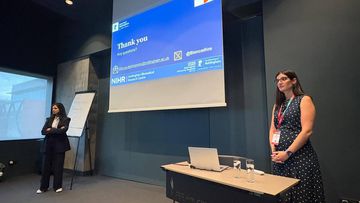Debate on the NHS England algorithm for MS treatment by disease-modifying drugs
Event reportsThe Neurology Academy hosted a debate at the ICC Birmingham this year to discuss the newly proposed NHS England algorithm for using disease-modifying treatments (DMTs) to manage multiple sclerosis (MS).
The full debate:
Do you wish you’d been there in person? With these slides, you can follow along with Dr David Paling as he makes his arguments in favour of the algorithm improving clinical practice. On the other side is Gavin Giovannoni and here are his presentation slides.
We interviewed a number of key people at the debate on 9th May to help get a clearer and fuller picture of what this algorithm will mean for both clinical practice and patient experience.
Keen to understand the algorithm from all angles? Come and listen to our other soundbites, presenting everything from the patient view to an Industry perspective.
Prof Gavin Giovannoni and Dr David Paling
Both eminent neurologists specialising in MS, were the main voices of the debate. Listen to this short video clip to understand their core arguments around:
- Why the algorithm has been made
- What the potential benefits and challenges will be nationally
- Why patients may welcome the algorithm
Dr Jeremy Hobart
Neurologist and chair of the debate, neatly sums up the debate around whether the algorithm will ultimately standardise prescribing practice. Listen for a two minute outline on the arguments made, and to find out how the votes sat at the end of the debate.
Philip Anderson
Head of Policy at the MS Society, shares the Society and patients’ views on the algorithm:
- Over 250 people with MS responded to a survey about this proposed change to practice.
- Patients feel this algorithm is an opportunity to be central to, and equal partners in, the decisions around DMTs.
- While positive, we cannot assume the algorithm will automatically mean a standardised national practice – it doesn’t deliver more staff or more money to meet the guidelines.
Dr John Thorpe
Leads the DMT service at Addenbrookes Hospital. He shared his views on what the algorithm might mean on a local level, thinking about his own team’s practice.
- The algorithm is built on existing guidance like NICE which is already followed in practice.
- It will help to give clarity for practice on lesser-used treatments and smooth out some of the inconsistencies.
- Multi-disciplinary meetings to agree prescribing locally may need to happen nationally to make sure that the theory all works in practice.
David Garmon-Jones
With 35 years’ experience in the pharmaceutical industry, gave us an Industry take on the new algorithm.
- The algorithm is a positive opportunity to raise the standards in safe and effective MS treatment.
- It reinforces the essential need for cost-effectiveness meaning data will need to be kept and gathered to show the value of different DMTs.
- Challenges will include the gap left for treating people with progressive MS, and a need for NICE to be approving innovative medicines so that patients can access the best treatments.
Related articles
Encouraging excellence, developing leaders, inspiring change
MS Academy was established in 2016 and in that time has accomplished a huge amount with exciting feedback demonstrating delegates feel inspired and energised along their personal and service development journeys. The various different levels of specialist MS training we offer are dedicated to case-based learning and practical application of cutting edge research.


